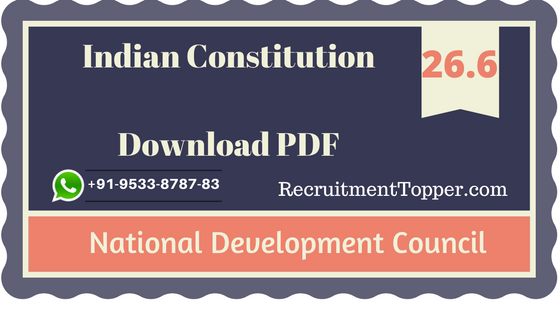National Development Council | Indian Constitution Download PDF
The working of the Planning Commission, again, has led to the setting up of another extra-constitutional and extra-legal body, namely, the National Development Council.
This Council was formed in 1952, as an adjunct to the Planning Commission, to associate the States in the formulation of the Plans. The functions of the Council are “to strengthen and mobilize the efforts and resources of the nation in support of the plans; to promote common economic policies in all vital spheres and to ensure the balanced and rapid development of all parts of the country”, and in particular, are—
(a) to review the working of the National Plan from time to time;
(b) to recommend measures for the achievement of the aims and targets set out in the National Plan.
Since the middle of 1967, all members of the Union Cabinet, Chief Ministers of States, the Administrators of the Union Territories and members of the Planning Commission have been members of this Council.
Besides the Planning Commission, the annual conferences, whose number is legion, held under the auspices of the Union, serve to evolve coordination and integration even in the State sphere. Apart from conferences held on specific problems, there are annual conferences at the highest level, such as the Governors’ Conference, the Chief Ministers’ Conference, the Law Ministers’ Conference, the Chief Justices’ Conference, which are of no mean importance from the standpoint of the Union-State as well as inter¬state relations. As Appleby has observed, it is by means of such contacts rather than by the use of constitutional coercion, that the Union is maintaining a hold over this sub-continent, having 25 autonomous States (now 29):
“No other large and important national government… is so dependent as India on theoretically subordinate but actually rather distinct units responsible to a different political control, for so much of the administration of what are recognized as national programmes of great importance to the nation.
The power that is exercised organically in New Delhi is the uncertain and discontinuous power of prestige. It is influence rather than power. Its method is making plans, issuing pronouncements, holding conferences… Any real power in most of the development field is the personal power of particular leaders and the informal, extra-constitutional, extra-administrative power of a dominant party, coherent and strongly led by the same leaders. Dependence of achievement, therefore, is in some crucial ways, apart from the formal organs of governance, in forces which in the future may take quite different forms.”
Recently National Development Council held its 57th meeting in New Delhi on 27-12-2012 and approved the strategy to achieve average growth rate of 8 percent during the 12th Five Year Plan (2012-2017), to generate 50 million new jobs and to increase investment in infrastructure sector.

Leave a Reply